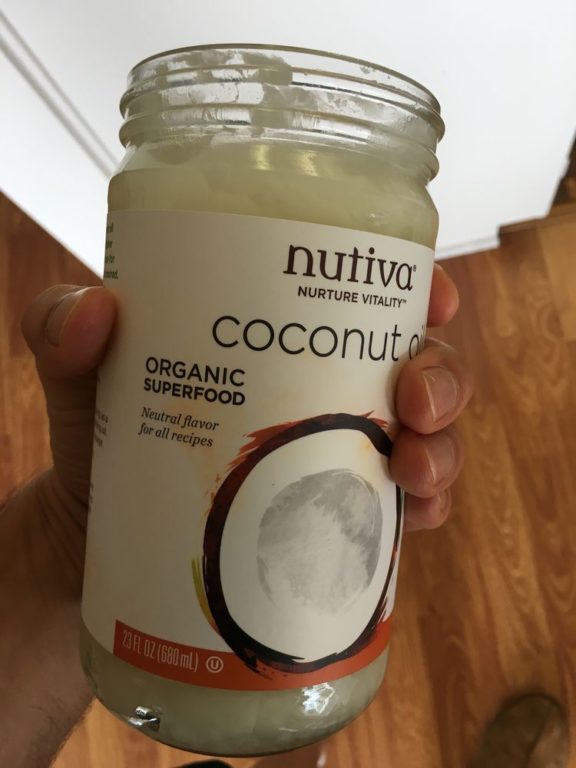21 Medicinal Uses for Coconut Oil

Coconut oil might just be the iPhone of the food world. Just as Apple took a small rectangular box and incredibly crammed a phone, video camera, flashlight, music library and a zillion other things into it, nature took the coconut and packed in a ridiculous number of uses and power.
With all the goodness in a jar of coconut oil, you could hypothetically toss out your coffee creamers, cooking oils, sports drinks, lip balm, mouthwash, shampoo, shoe shine, furniture polish, hand soap, acne cream, and much more, and replace it all with a single jar of coconut oil. Well, you’d probably need multiple jars for all that, but you get the idea.
While we’ve written other articles on coconut oil’s many food uses, as well as its many skin, hair and beauty uses, here we’ll focus on its medicinal power. The secret to coconut oil’s medicinal aptitude lies in its fat content: 91% healthy saturated fats and more than 85% medium-chain triglycerides, aka medium-chain fatty acids (MCFAs).
MCFAs are fascinating little things. They’re easy to digest, provide quick but long-lasting energy, and have anti-viral, anti-microbial, anti-bacterial, anti-inflammatory, anti-fungal, and antioxidant properties. According to Dr. Mary Enig, a nutrition research scientist for the Weston A. Price Foundation, MFCAs may even contain anti-cancer properties. Three MCFAs in particular are responsible for the majority of coconut oil’s medicinal powers: lauric acid, capric acid, and caprylic acid.
To date, more than 1,500 studies have been published on the health benefits of coconut oil. We’ll look at some of the most exciting benefits, including:
- Prevention of diabetes, cancer, heart disease and osteoporosis
- Natural treatment for cancer, Alzheimer’s, and arthritis
- Helps with weight loss, fat loss and muscle gain
- Lowers blood pressure and bad cholesterol
- Clears up UTIs and kidney infections
- Improves memory and overall brain function
- Effective treatment for burns, dry skin, eczema, acne, dermatitis and psoriasis
- Balances hormones and blood sugar levels
Why Extra Virgin Coconut Oil is Best for Medicinal Uses
Wait, there’s more than one type of coconut oil? Yes. And before we review the above-listed benefits, it’s important to note how they differ. There are two main types: refined and virgin. They’re easily differentiated by the process used to extract the oil.
Refined coconut oil is pulled from dried coconut meat, at times with chemicals aiding the process. It’s then treated with bleaching clays, high heat and sometimes even more chemicals to eliminate its odor, taste and any contaminants that may have shown up during the drying process. Sometimes the oil is hydrogenated too, basically turning it into a synthetic trans-fat.
Virgin coconut oil is extracted in two ways: quick drying or wet milling.. In the quick drying process, the oil is extracted mechanically. During wet milling, milk is expressed from the wet coconut meat, and the oil is separated from the milk with boiling, fermenting, or enzymes and a centrifuge. Both methods start with fresh coconut meat and are 100% chemical free.
Extra virgin coconut oil is better for medicinal uses because it’s the least altered by the extraction process. As Elizabeth Walling, a contributing author to The Nourished Life, correctly points out, refined and virgin oil both contain the same amount of MCFAs, and chemicals aren’t necessarily added to refined brands. However, Dr. Josh Axe maintains that refined coconut oil is chemically altered by its extraction process and thus stripped of many of its health benefits.
The oil in virgin varieties, especially when extracted by wet-milling and fermentation, preserves its original chemical makeup and therefore its health benefits as well. Dr. Axe adds that compared to refined coconut oil, virgin coconut oil has higher levels of anti-oxidants and is more effective in maintaining bone structure and reducing inflammation.
With its high smoke point and neutral smell and flavor, refined coconut oil certainly has its uses in the kitchen. But when using coconut oil specifically for medicinal benefits, stick with organic extra virgin coconut oil, and Nutiva is a great choice.
21 Medicinal Uses for Coconut Oil
So what can coconut oil do for your health, and how exactly it pulls off its magic?
Extra virgin coconut oil can:

1. Reduce Arthritic Pain and Inflammation. Virgin coconut oil relieves both the pain and symptoms of arthritis by suppressing inflammatory cells – and it does so better than leading medications.
2. Balance Hormones. Coconut oil’s healthy fat content helps to balance hormones in two ways: first, it eases the strain on the thyroid and adrenal glands, which lowers cortisol levels; second, it suppresses inflammation and supports a healthy metabolism by providing energy that’s easy to digest and absorb. Consequently, coconut oil may be helpful in balancing estrogen levels in women going through menopause. To take advantage of these benefits, replace grains and sugars with more of the healthy fats found in avocados, flax seeds, ghee and, of course, coconut oil.
3. Boost the Immune System. Coconut oil boosts your entire immune system just by way of giving it a break. With coconut oil’s MCFAs busy ridding your system of viruses, fungi, parasites and bad bacteria, your immune system can take care of the rest of your body more efficiently and effectively.
4. Treat and Reduce the Risk of Osteoporosis. Virgin coconut oil’s antioxidant-rich MCFAs treat and prevent osteoporosis by reducing its leading causes, namely oxidative stress and free radicals. Recent studies also highlight coconut oil’s ability to decrease bone loss, preserve bone structure and, by encouraging increased calcium absorption in the gut, even increase bone volume.

5. Improve Brain Function and Treat Alzheimer’s. Alzheimer’s-affected brains suffer from an inability to create insulin, which is needed to break down the body’s main energy source, glucose. Coconut oil, however, is digested by the liver into ketones, which the brain can use as energy without needing insulin to break them down. This means that coconut oil can provide an alternative energy source for the brain, giving it the power needed to repair itself. Marie Nowak MD tells an inspiring story of watching the thoughts of her Alzheimer’s-suffering mother grow clearer only days after adding small amounts of coconut oil to her diet.
6. Reduce Tumor-Growth and Cancer-Risk. Cancerous tumors, which rely on glucose for growth, can’t access the energy of the ketones produced during coconut oil’s digestion. So a diet high in coconut oil, and thus high in ketones, is a natural way to prevent the growth of tumor cells. Coconut oil may also reduce the risk of stomach cancer by killing the particularly nasty h. pylori bacteria, which has been linked to stomach cancer.
7. Stabilize Blood Sugar Levels and Prevent Diabetes. Once again, ketones prove to be awesome, this time in preventing diabetes. Because MCFAs and ketones don’t rely on pancreatic enzymes (like insulin) to be broken down, regular consumption of coconut oil gives your pancreas a much needed break. This stabilizes blood sugar levels and reduces the risk of cells developing insulin resistance, which leads to Type II diabetes. That’s in addition to the fact that introducing low amounts of healthy fat into your diet can decrease the drive for quick sugar fixes, as well as sugar consumption.
8. Reduce Symptoms of Gallbladder Disease & Pancreatitis. Reduced strain on the pancreas means that coconut oil also reduces symptoms of pancreatitis. And the same goes for the gallbladder and gallbladder disease.

9. Help You Burn Fat and Lose Weight. MCFAs, specifically capric and caprylic acid, can help decrease your appetite, lower your resting heart rate, and increase your body’s fat-burning capabilities. In one study, when fat cells in rats were injected with caprylic acid, the rate at which the fat cells broke down was identical to that of fasting. For help burning fat and losing weight, replace creamer in your coffee with a TBSP of coconut oil. It’s pure fat though, so as is the case with most things – moderation is key.
10. Build Muscle. Coconut oil not only helps with burning fat and losing weight, but it builds muscle too. The MCFAs found in coconut oil are specifically used in mainstream muscle-building products such as Muscle Milk. Plop 3 TBSP of coconut oil into your morning shake and you’ll see results.
11. Support Healthy Digestion. We’ve pretty much established coconut oil as a veritable powerhouse of digestive support. It’s easily digestible itself, and its natural “anti-” properties (remember those? Bacterial, fungal, microbial, viral, parasite, and oxidant) cleanse, while reducing strain on the whole digestive system. Coconut oil reduces inflammation and stomach ulcers, kills bad bacteria and promotes the growth of good bacteria, and helps heal ulcerative colitis and leaky gut. Coconut oil also makes it easier for the body to digest calcium, magnesium and fat-soluble vitamins (A, D, E and K), and to top it all off, coconut oil doubles the effectiveness of omega-3 fatty acids (found naturally in fresh fish, among other things) when the two are eaten together.
12. Relieve Constipation. Coconut oil’s cleansing, balancing and supportive effects on the digestive system can relieve bloating and chronic constipation. Take 1 TBSP of coconut oil in the morning or before bed daily for help with regular bowel movements.
13. Cure Urinary Infections and Protect the Liver. Coconut oil can heal kidney and urinary tract infections (UTIs), clear out kidney stones and reduce toxin-damage to the liver – all thanks to its potent antibiotic properties.

14. Slow Down Aging. Coconut oil’s anti-oxidative effects help to reduce stress on the liver, which slows down the body’s aging process. Try 1 TBSP of coconut oil with some fresh berries (which are also rich in anti-oxidants) for an anti-aging breakfast boost.
15. Soothe a Sore Throat. As little as a ½ teaspoon of coconut oil 3x a day can relieve the pain of a sore throat. Try adding coconut oil, honey and lemon to a licorice or fennel root tea for an immune-boosting, throat soothing delight.
16. Kill Candida Overgrowth. Coconut oil’s yeast-killing anti-bacterial and anti-microbial properties make it an effective natural treatment for candida overgrowth, arguably more so than even the drug fluconazole.
17. Heal Your Pets. Coconut oil’s healing properties will work for your pets just as well as they would for you. Mix a little in their food to address digestive issues or apply it topically for skin issues.
18. Support Heart Health. Coconut oil’s healthy saturated fats help lower high blood pressure and increase good (HDL) cholesterol levels, while lowering bad (LDL) cholesterol levels. That all adds up to a reduced risk of heart disease and an overall healthier heart.
19. Improve Energy Levels. Follow the lead of many triathletes today and use coconut oil as a source of quick, long-lasting energy before and during exercise. Down a mix of a TBSP each of coconut oil, raw honey and chia seeds 30 minutes before a highly intense workout for sustained energy.

20. Support a Healthy Mouth. Swish coconut oil around in your mouth (aka “oil pulling”) for 20 minutes 3x a week and the anti-bacterial MCFAs will rid your mouth, gums and teeth of harmful bacteria, while helping to heal and reduce the risk of periodontal disease.
21. Treat Skin Issues. Coconut oil is a powerhouse of health and healing for the skin as well. Not only does it reduce inflammation and kill harmful bacteria and microbes, coconut oil moisturizes too. It’s been shown to be an effective topical treatment for Eczema, Psoriasis, acne, wrinkles, cellulite, dandruff, stretch marks, burns, wounds, rashes, cold sores, fungal infections like athlete’s foot, and skin conditions caused by candida and yeast infections. For happy, healthy skin, try a mixture of coconut oil, shea butter and geranium oil, or a mixture of coconut oil with tea tree oil and raw honey to treat acne specifically.
Before You Go
A few final words of advice as you head out the door to buy your own jar of organic extra virgin coconut oil:
Please remember the earth when you choose your coconut oil. Look for companies with the Fair Trade Certified logo on the jar, which indicates both the environment and the farmers are treated with respect. Avoid companies that contribute to deforestation or unsustainable environmental policy, or who take advantage of the fact that 60% of coconuts are harvested from impoverished areas.
Secondly, if you have a sensitive digestive system, Elizabeth Walling recommends starting with less than a teaspoon per day, to give your system time to adjust to the strong anti-bacterial, anti-viral, and anti-fungal effects. Take it slowly, listen to your body’s individual reaction, and adjust the dosage accordingly.
